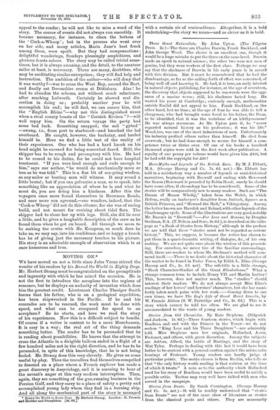MOVING ON.*
WE have moved on not a little since Jules Verne stirred the wonder of his readers by his Round the World in Eighty Days. Mr. Herbert Strang must be congratulated on the promptitude and ingenuity with which he has seized the occasion. He is not the first to introduce the aeroplane into the regions of romance, but he displays an audacity of invention which does him the greatest credit. Lieutenant Charles Thesiger Smith learns that his father, who is on a geological expedition, has been shipwrecked in the Pacific. If he and his comrades are to be rescued, the work must be done with speed, and what can be compared for speed to an aeroplane P So he starts, and here we read the story of his experiences. Now this is a difficult subject to handle. Of course if a writer is content to be a mere Munchausen, it is easy in a way ; the real art of the thing demands something better. The reader has to be persuaded that he is reading about possibilities. He knows that the attempt to cross the Atlantic in a dirigible balloon ended in a flight of a few hundred miles not in the right direction, and he has to be persuaded, in spite of this knowledge, that he is not being fooled. Mr. Strang does this very cleverly. He gives us some useful by-play. Thus the travellers find themselves compelled to descend on a place where a French explorer has made a great discovery in Assyriology, and it is amusing to hear of the savant's anger at this very modern interruption. Then, again, they see something of the gun-running business in the Persian Gulf, and they carry to a place of safety a pretty and accomplished young lady whom they find in a burning ship. And all along the mechanical part of the story is managed • Bound the World in Seven Days. By Herbert Strang. London : H. Prowde end Hodder and Stoughton. Pe. Bd.] with a certain air of vraisetablance. Altogether, it is a bold undertaking—the story we mean—and as clever as it is bold.


































































 Previous page
Previous page